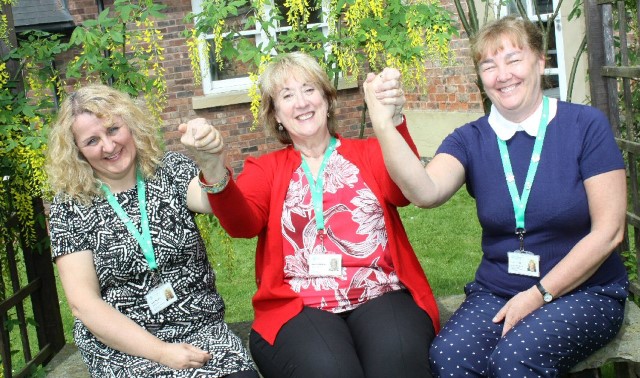A PIONEERING organisation has launched its vision for transforming the future of dementia care.
St Teresa’s Hospice, Darlington, has set out its five key commitments to support the development and excellence of care for people living with the degenerative disease.
Dementia, which currently affects over 850,000 people in the UK, is predicted to rise to over one million and is set to become the 21st century’s biggest killer.
Chief executive of St Teresa’s Hospice, which serves the people of Darlington, South Durham and North Yorkshire, Jane Bradshaw, said: “As an organisation we looked at our dementia strategy and through internal audit with Dementia First Steps and Hospice UK decided to take our existing care to the next level.
“We already have in place a dementia champion, in our head of workforce development Diane Farrell, whose knowledge and work with dementia friends training is helping us move forward in our strategic approach.
“This training will enable us to create at least 200 new Dementia Friends within our organisation, from the board of Trustees to volunteers and friends of St Teresa’s, and create a cultural acceptance of dementia throughout the whole organisation.”
St Teresa’s Hospice’s five key commitments include:
- Education – creating awareness and developing advanced dementia care skills within the workforce
- Ensuring timely identification and individual care
- Making the environment dementia friendly
- Ensuring resources meet the needs of patients with dementia
- Ensuring effective communication throughout the organisation and externally
“Following through on all five key actions will give us a broad well rounded view for people with dementia and a collaborative approach with other organisations outside the hospice,” said Mrs Bradshaw.
“In making these pledges we aim to become more proactive as an organisation in being able to care not only for people living with dementia but also their friends, family and carers.”
Mrs Farrell added: “In general people are living longer and more and more people will be affected by dementia in the future.
“We are already seeing this reflected in the patients at St Teresa’s as well as among family members of some of our own staff members and volunteers.
“Changing culture means that dementia is now considered a palliative illness and the mere fact of talking about and championing the disease means that everyone can become an advocate and supporter of people living with dementia.”
